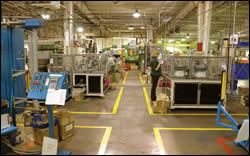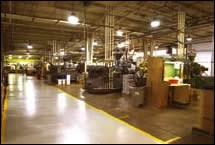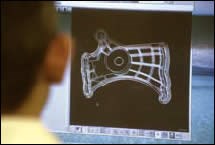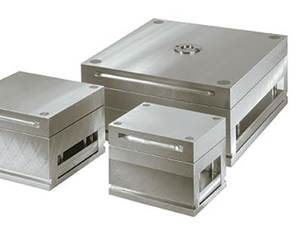Melt Management’s Role in a More Efficient Mold
One shop is finding great success—through special standardization—cutting scrap and runner costs by balancing the flow in the molds and reducing cycle times while using smaller, most cost-efficient presses.
With many custom mold shops losing business to foreign competition, it is clear that thinking outside of the box is necessary to compete globally. One custom molder, Viking Plastics (Corry, PA), has decided to take a proactive approach to this dilemma by implementing several strategies, which include a revolutionary melt management technology.
According to Viking Plastics VP of Sales and Marketing Peter Kraus, the following has recently occurred at the company:
- New owners—VPI Acquisition Corporation acquired the assets of Viking Plastics in August, 2006.
- A commitment to aggressive growth through the company’s capital reinvestment program.
- An ongoing equipment conversion program. To better serve the automotive fuel and HVAC markets, Viking recently purchased a state-of-the-art, all-electric injection molding press integrated with a new high-speed picker and part diverter—the first of several planned for purchase. Expanding Viking’s cellular manufacturing capacity, the equipment yields tighter tolerances and improved quality through SPC production monitoring and scientific molding with suspect-process diversion.
- New technology to supply high-quality, precision-engineered compo-nents crucial to the automotive, HVAC and industrial manufacturing sectors—most notably injection molding process enhancements via MeltFlipper® technology, produced by Erie, PA-based Beaumont Technologies (BTI) and successfully utilized at Viking (with tangible results) in a mold/program transfer from a tier-one automotive customer.
A Little Background
Viking Plastics has been providing tight-tolerance injection molding and assemblies for the automotive, industrial and HVAC industries for 35 years with the help of 85 employees. According to Viking’s Senior Program Manager Marty Radock, the company maintains profiles of .05mm; also +/-.03mm up to +/- 0.08mm (depending upon the material) for general/linear characteristics on all of its work. Holding tolerances like these resulted in challenges like managing regrind and balancing runners in high cavitation, family molds.
To solve these problems, Viking chose Beaumont Technologies’ MeltFlipper technology. “This technology allowed us to reduce runner size—thus reducing regrind percentage and management—and simultaneously balance the cavities,” Radock explains. “This also led to reduced material management costs and improved quality. Cases include new tool builds like a resonator bracket and refurbishment of existing molds—such as a cam mode—with this technology.”
How It Works
According to Radock, MeltFlipper technology “offers a root-cause solution to material flow and balance problems—providing the first true balance of pressure, temperature, viscosity and material properties throughout the entire mold.”
Radock recalls a recent job that used the technology. “We inherited a transfer job from a tier-one automotive customer involving a four-cavity mold utilized for an HVAC system,” he explains. “We got the job when, at best, three of the four cavities worked along with many other quality issues when filled with a reprocessed mineral-filled nylon and our customer believed we could fix it. Given that many on the Viking team are graduates of the Plastics Engineering Program of Penn State Behrend (Erie), we immediately knew there was a problem with an imbalanced tool and that the solution was MeltFlipper technology.” Since incorporating the MeltfFlipper the mold has run full cavitation with no quality issues being reported by the customer.
Imbalanced filling is a major challenge and source of product variations in the plastics industry—occurring in both hot and cold runner systems—by shear-induced, non-uniform material properties within a mold’s melt delivery system, Radock continues. “In addition to uneven mold filling, these variations often lead to other problems such as extended mold commissioning times, dimensional instability, flash, sink, short shots, the need for higher injection pressures, longer cycle times and high scrap rates, among others.”
MeltFlipper technologies (offered on a licensing basis for individual molds or many programs) were retrofitted onto existing molds at Viking. The company uses Incoe hot runners on their Nissei, DeMag and Van Dorn injection molding presses. Radock notes that success with these retrofitted molds has prompted Viking to consider using this technology in new programs pending with automotive customers.
Growth Realized
“This technology has enabled us to grow our business through several projects involving co-products molding in 16 or higher cavity molds,” Radock says. “Our customers find that Viking can produce more products with faster mold commissioning times, balanced flow (meaning better parts), faster cycle times and less scrap. The data on the success of our use of MeltFlipper technologies shows that we are able to reduce both runner and press size, as well, as we changed molding from a Van Dorn 200-ton press to a smaller Nissei with greater psi. Furthermore, working with our material supplier to re-characterize materials for even better flow has helped us achieve much higher cavitation.
According to Shawn Gross, Viking Plastics’ Manufacturing Manager, using the new technology allowed the company to eliminate short shots and add 20 percent to their capacity to better serve a global automotive customer. “We are quite outspoken in showing our customers the value and benefits of MeltFlipper technology, which, among many other facets of our operations, sets Viking Plastics apart and puts us in a highly competitive position,” Gross emphasizes.
Viking Plastics Plant Manager Greg Bowes sums thing up succinctly. “Viking is very accustomed to inheriting problematic tools from previous vendors and offering a variety of engineered solutions,” Bowes says. “MeltFlipper has worked well for us from the start with improved flow and mold balance, and also has contributed to reductions in both material usage and scrap. In one program, scrap reduction is already estimated at 25 to 50 percent.”
Related Content
ICYMI: MMT Chats: True Leadership Leads to Mentoring, Part 1
This trio from TK Mold and Engineering in Romeo, Michigan, joins me to discuss the role of leadership and culture in mentorship. This episode is brought to you by ISCAR with New Ideas for Machining Intelligently.
Read MoreWomen Impacting Moldmaking
Honoring female makers, innovators and leaders who are influencing our industry's future.
Read MoreExploring ISO 9000 - Part 16 Control of Quality Records
A Series of International Standards for Quality Management and Quality Assurance. We begin 2022 with a review of Clause 4.16 Control of Quality Records.
Read MoreConsiderations for Mold Base Material Selection
Choosing the right material can greatly affect the profitability and cost of your application.
Read MoreRead Next
Five-Step Process Accelerates Part-to-Production Leadtimes
With mold commissioning analysis technology and melt rotation technologies, multicavity molds can now be commissioned faster to meet the critical time-to-market timeline, while achieving cost savings and continuous improvement in all aspects of product, process and productivity.
Read MoreAchieving Cavity Balance: Another Factor for Success
A look at good and bad cavity layouts and runner designs.
Read MoreHow to Use Strategic Planning Tools, Data to Manage the Human Side of Business
Q&A with Marion Wells, MMT EAB member and founder of Human Asset Management.
Read More




























